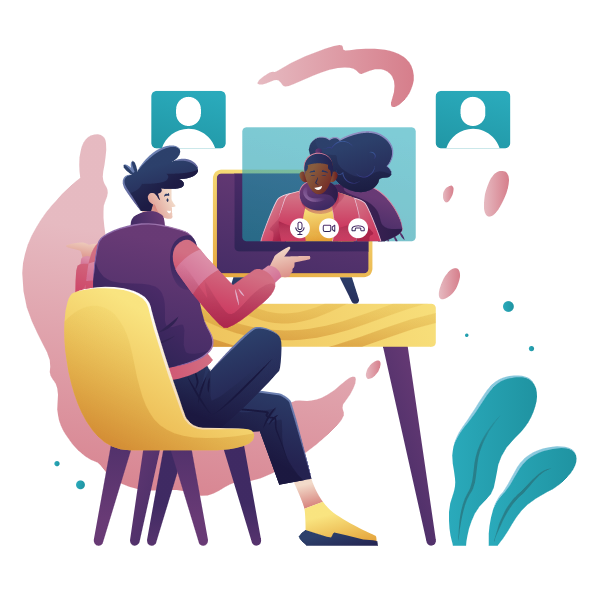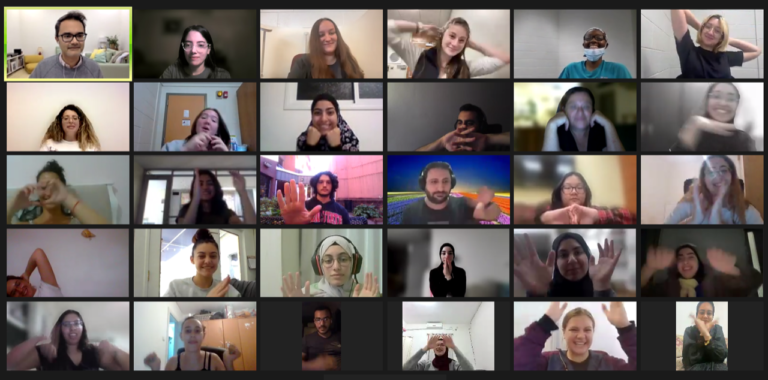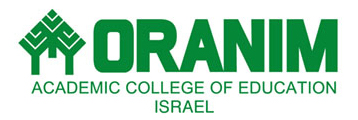GAME CHANGERS
CREATIVE NEGOTIATION SKILL-BUILDING & INTERNATIONAL VIRTUAL EXCHANGE PROGRAM

The Game Changers program is supported by the Stevens Initiative, which is sponsored by the U.S. Department of State, with funding provided by the U.S. Government, and is administered by the Aspen Institute. The Stevens Initiative is also supported by the Bezos Family Foundation and the governments of Morocco and the United Arab Emirates.
ABOUT
The Game Changers virtual exchange program, conducted by PATHWAYS Institute for Negotiation Education, brings together undergraduate students from the United States and aspiring educators in Israel for interactive learning and practical training in negotiation. Through team-based exercises, strategic problem-solving, and real-world simulations, participants sharpen their decision-making, leadership, and critical thinking skills, gaining a competitive edge for their future careers. This program is built on a proven negotiation methodology developed at Harvard, equipping participants with high-value skills applicable across industries.
JOIN THE PROGRAM AS A PARTNER
The Game Changers program is supported by the Stevens Initiative, an innovative international exchange initiative. The program is offered free of charge to participating U.S. universities and colleges. As the program grows, we are open to welcoming new partners in the U.S. Please submit the form below to explore offering this program to your students.
SCHEDULE
- March 9–20 – Asynchronous exchange
- March 10 & 12 – Live sessions on Zoom (9:00-10:15 MT // 17:00–18:15 ISR)
- March 24 & 26 – Live sessions on Zoom (9:00-10:15 MT // 17:00–18:15 ISR)
- March 30–April 10 – Asynchronous exchange
TBD
TBD
PATHWAYS
PATHWAYS Institute for Negotiation Education is a non-profit organization dedicated to problem-solving education through practical negotiation training and leadership development. Our goal is to equip students, educators, and professionals with the mindset and tools necessary to navigate complex negotiations effectively. We focus on strategic communication and results-driven collaboration based on a negotiation framework developed at Harvard University.
More information: www.pathwaysnegotiation.org
QUOTES FROM PARTICIPANTS
“Negotiation appears in many facets of our lives in which we interact with others. If we realize that, it can change our perspective on how we want to ‘show up’ to a given situation.”
“Something that I’ve learned that is important in negoitation is taking time to understand the other’s point of view.”
“I loved all of the activities and negotiation practices. I also really enjoyed the people taking part in it.”
“The program is unique. I liked how it is well-organized and well-studied. The content was presented clearly and precisely.”
“I found the role play activities especially interesting and relevant because I got to actually be able to apply the skills taught.”
“It was super fun overall and I’m glad to have met everyone there!”
ARTICLES

PARTNERS
FAQ
PATHWAYS Institute for Negotiation Education, a non-profit organization, leads the program with support from The Stevens Initiative. Partners include universities and colleges in the U.S.A. and teachers colleges in Israel.
The Stevens Initiative expands global collaboration and career development through virtual exchange. Founded in 2015 in honor of Ambassador J. Christopher Stevens, it funds high-impact programs, shares insights, and advances virtual exchange adoption. Supported by the U.S. Department of State, the Aspen Institute, and global partners, the initiative provides participants with valuable international experience and practical skills for success in a competitive world.
The Game Changers program is open to undergraduate students and pre-service teachers enrolled at participating universities and colleges. Schools must be official partners for their students to enroll.
The program is currently covered by a grant from the Stevens Initiative. There is no cost to accepted partner institutions or students to participate.
Participants will develop negotiation expertise based on Harvard’s problem-solving framework, acquire practical leadership skills, and connect with global peers. Graduates receive a certificate of completion and gain access to the Department of State’s International Exchange Alumni Network and the Localized international professional development platform.
Partner institutions in the U.S. recruit cohorts of students to participate in the program, create incentives for student participation, and supervise their students’ participation. Each partner school assigns one point person to help coordinate the program and students’ involvement.
Through the program, partners will be able to provide their students with a unique, interactive, and rewarding virtual learning experience.
Schools will be publicly recognized as partners of the Stevens Initiative and U.S. Department of State and gain visibility and access to additional exchange and networking opportunities.
We are currently seeking U.S. universities and colleges to join the program, with a focus on undergraduates in social sciences. Please complete the form below and we will be happy to discuss with you.
All MENA spots are currently filled for upcoming editions, but please contact us to express interest in participating in the future editions.
Each semester-long program includes:
- One week of independent preparation: Participants complete introductions and reflect on negotiation scenarios.
- Four interactive Zoom workshops (~75 minutes each, twice per week): Hands-on negotiation training and simulations with peers.
- A final reflection week: Participants record and share insights and practical applications of their learning.
The Game Changers program provides a structured curriculum combining interactive exercises, strategic role-playing, and practical negotiation training. Live sessions include hands-on simulations and discussions between participants from different universities.
- Asynchronous Opening: Participants introduce themselves through brief videos, offering insight into their backgrounds, interests, and academic experiences. They also reflect on real-world negotiation scenarios and key decision-making principles.
- Know Your Game: Participants engage in interactive exercises and a high-stakes role play to explore key choices in negotiation and understand how assumptions shape outcomes.
- Creative Negotiation: Using the Harvard Negotiation Project’s seven elements framework, participants experiment with negotiation strategies through structured role-playing activities.
- Constructive Communication: This session focuses on communication skills, exploring how to navigate different viewpoints, influence effectively, and engage in productive problem-solving.
- Looking Ahead: Participants discuss how to apply negotiation skills in their careers and communities, exchanging insights on leadership and strategic decision-making.
- Asynchronous Closing: Participants create a final video summarizing key takeaways from the program. Some institutions require a short reflection paper or a proposal for applying negotiation concepts in education, business, or other professional settings.
“Many of our students would love to travel abroad, but they are unable to afford it or fit it into their schedules. Game Changers has allowed our students to interact across cultures and gain negotiation skills virtually.” – Emily Spitzman, Ph.D., Associate Professor, Bridgewater State University
—
“My students had an excellent experience in the program. The information about the course assignments, attendance, [and] participation was helpful to me as [an] instructor. Having this information enabled me to connect with students regularly about their progress in the course. By not having to track down assignments, I was able to spend additional time engaging with my students about the course material.” – Karen DeAngelis, Ph.D, Associate Professor, Fitchburg State University
CONTACT US
Please write us for more information or to express your interest in joining the program as an institutional partner.



















